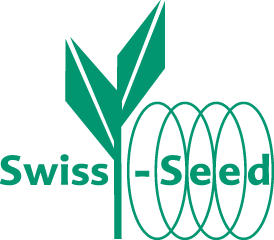VESKOF Quality Requirements according to Swiss-Seed Rules
and additional information concerning the seed trade with Switzerland
1.
In Switzerland the fodder crop production plays a key role, milk and meat are the main products of our agriculture.
For decades the Swiss seed trade has imposed especially high requirements on seed sold in Switzerland. In April 1984 these requirements were published as VESKOF Rules (VESKOF = Vereinigung Schweizerischer Kontrollfirmen für landwirtschaftliche und Gemüsesämereien, later called VSSJ = Verband Schweizerischer Saatgut- und Jungpflanzenfirmen and from 1 January 2007 on Swiss-Seed = Swiss Association for seed trade and plant breeders' rights). Since then they have been known and established as Swiss Rules world-wide. Therefore, following the name changes of the association the name VESKOF has been retained and registered as a protected trademark (date of registration: 08. 31.1999). Thus, the VESKOF Rules are a protected quality label. Together with the well adjusted mixture prescriptions published by the Swiss Federal Research Stations in the "Agricultural standard mixtures" and the exclusive use of top selections according to the "Recommended variety list", the VESKOF Rules have contributed to the world-wide recognition of the superior quality level of the Swiss fodder crop production.
2. Legal basis
The requirements for seed traded in Switzerland are specified in the Enactment of the Federal Department of National Economy on agricultural and fodder crop species dated 07.12.1998 and the Amendments of 22.12.1999, 08.03.2002 and 02.05.2005. The VESKOF Rules are based on this Federal Decree specifying the legal minimum but demand enhanced requirements in particular for germination, purity of seed in general and especially concerning large leafed dock species (Rumex crispus, Rumex obtusifolius).
Contracts between a Swiss importing company and its foreign supplier are basically subject to the ISF rules and usages (International Seed Federation).
3. Sampling
Seed sampling has to be done according to the ISTA Procedures (International Seed Testing Association).
4.
Recently, there were complaints about seed which met the Rules of the European Community as well as the VESKOF Rules but contained seed of plant species which did not exist in Switzerland up to this date (e.g. Johnson grass and Amaranthus). To prevent propagation of such alien species, the Swiss importer may demand upon mutual agreement with the supplier seed which is free from any seed of such alien species.
5.
Absence of large leafed dock species according to VESKOF Rules (10 grains per kilogram): The maximum number of grains of large leafed dock species (Rumex crispus, Rumex obtusifolius) applies to the minimum sample size according to VESKOF shown in the last column of the tables (chapter 6).
| tested weight | number max. of Rumex graines |
|
|---|---|---|
| Small seeded grasses Poa spp., Agrostis spp., Phleum spp., etc. |
50 g | 0 |
| Other grasses Festuca spp., Lolium spp., Dactylis glomerata, etc. |
100g | 1 |
| Clovers Lotus spp., Medicago spp., Trifolium spp. |
200g | 2 |
| Exception: White clover, Trifolium repens | 100g |
1
|
If, for example, 1 grain of rumex is found in a sample of 50 g of small seeded grasses we recommend to analyze several samples to be able to declare that the lot contains maximum 10 grains of large leafed rumex per kilogram supported by statistical verification.
6.
Quality requirements VESKOF for agricultural seeds.
Swiss Association for seed trade and plant breeders' rights
Contact
Swiss-Seed
In der Euelwies 34
8408 Winterthur
